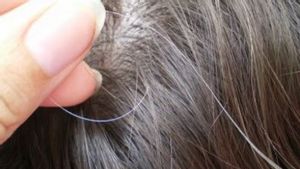JAKARTA - For generations, rumors have circulated about the bad effects of smoking on health, including its alleged role in causing premature gray hair. While it is known that smoking poses many health risks, the relationship between smoking and gray hair is not as simple as it has been so far believed. Let's investigate the science facts behind this phenomenon and separate the facts from fiction.
First, it is important to understand the natural process of gray hair. With age, hair follicles gradually produce fewer melanin, the pigment in charge of giving hair color. The decline in melanin production causes the appearance of gray or white hair. Genetics plays an important role in determining when this process will begin and how fast its development will be.
Although genetic factors mainly determine the emergence of gray hair, external factors such as smoking are thought to also affect the process. Several studies have explored potential relationships between smoking and premature gray hair, but the findings are still diverse.
Several studies have shown that smoking does contribute to premature gray hair. The reasons behind this theory lie in the harmful effects of smoking against overall health and cellular processes. Smoking is known to result in oxidative stress in the body, which causes cell damage and accelerates tissue aging, including hair follicles. In addition, smoking has been associated with a decrease in melanin production, which can theoretically accelerate the graying process.
However, other studies failed to find a definite relationship between smoking and premature graying. Factors such as age, ethnicity, and lifestyle habits complicate the relationship between smoking and hair color. In addition, the exact mechanism for smoking can affect melanin production and hair pigmentation is still unclear.
It is important to know that although smoking can lead to premature aging and various health problems, its immediate impact on hair color may not be too significant compared to previous estimates. Genetics, stress, nutritional shortages, and other environmental factors play an important role in determining the timing and development of gray hair.
In addition, quitting smoking can have many positive impacts on overall health and well-being, regardless of its effect on hair color. By quitting smoking, a person can reduce the risk of developing various diseases, improve heart health, and improve overall quality of life.
SEE ALSO:
Although there is a relationship between smoking and premature gray hair, the evidence that supports this relationship is still inconclusive. Genetics and other environmental factors are likely to have a more significant impact on the aging process.
Quitting smoking is still an important step towards overall health improvement and must be pursued because there are many benefits in addition to maintaining hair color.
The English, Chinese, Japanese, Arabic, and French versions are automatically generated by the AI. So there may still be inaccuracies in translating, please always see Indonesian as our main language. (system supported by DigitalSiber.id)


















